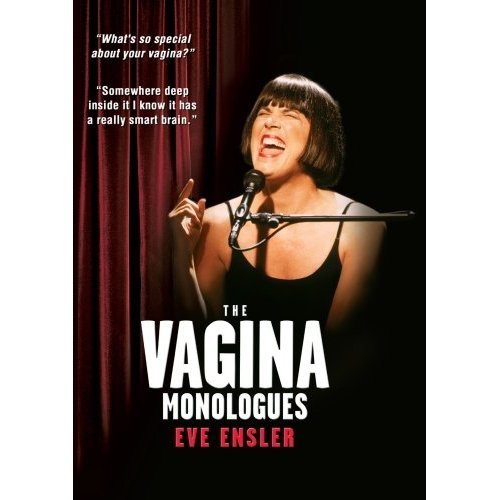Earlier this month, Mt. Holyoke, the prestigious all-women's college, decided to cancel its annual production of The Vagina Monologues, which has been performed at the school for 10 years. The discussion got heated pretty quickly, with interested parties from a variety of backgrounds weighing in. So in the way of background, just what is this play about (although the title gives a pretty good clue):
The Vagina Monologues is made up of a varying number of monologues... Each of the monologues deals with an aspect of the feminine experience, touching on matters such as sex, love, rape, menstruation, female genital mutilation, masturbation, birth, orgasm, the various common names for the vagina.
Okay, that certainly grabs my attention (and yes I have seen it.) Not everyone likes to talk about vaginas and everything that goes along with having one or knowing people who do. Throughout its history, the play in its very subject matter has created discussion and in many cases, controversy. It has been criticized as coming from a "white woman's perspective on female experience... for being tone-deaf to cultural difference and women's agency."
So what was the issue at Mt. Holyoke? According to the e-mail sent to students explaining the cancellation of the performance this year.:
At its core, the show offers an extremely narrow perspective on what it means to be a woman... Gender is a wide and varied experience, one that cannot simply be reduced to biological or anatomical distinctions, and many of us who have participated in the show have grown increasingly uncomfortable presenting material that is inherently reductionist and exclusive.
I am totally on board that college campuses are places to discuss, argue, challenge, disagree -- and all with great passion. In fact, I wholeheartedly support Mount Holyoke's right to make whatever decision it sees fit. But the specific objection at Mt. Holyoke seemed to take a different tact, getting a little more personal, characterizing Ms. Ensler as divisive. And I was really struck by how quickly the e-mail turned into something that seemed to miss the original point of the play.
The letter didn't mention (at least in what I could find) that 10 years ago, a specific monologue about people in the transgender community, was made available to, to be added to any performance. In Ms. Ensler's own words, the change was "a deliberate decision on my part to encourage communities to address the needs and realities of the transgender community. Trans women and trans men have been welcome to perform in The Vagina Monologues throughout its history." That certainly doesn't sound like someone intending to exclude. In fact, every year a new story is added to the play that highlights current issues.
The play has been performed around the world (last count 140 countries), and translated into almost 50 languages. Ms. Ensler has been showewed with countless honors and recognition for Vagina Monologues as well as the creation of V-Day, described as "a global activist movement to stop violence against women and girl". The movement has raised over $100 million. This is not some fly by night person, organization or effort -- who has a narrow view of society.
Ms. Ensler is the first to admit that the play is not meant to be the "be all, end all" about femininity, sexuality, womanhood, values, choices. It was meant to share experiences, stimulate thinking, create opportunities for growth. In a recent article she wrote for Time, Ms. Ensler provided a clear perspective:
The Vagina Monologues never intended to be a play about what it means to be a woman. It is and always has been a play about what it means to have a vagina. In the play, I never defined a woman as a person with a vagina... Inclusion doesn't come from refusing to acknowledge our distinctive experiences... Inclusion comes from listening to our differences... That's real inclusion -- to listen to different stories, with curiosity, and love, and respect, in all their particular and distinctive human individuality.
I don't know Eve Ensler. She has not asked me to defend her, nor clearly does she need my help. But I do respect what she has accomplished with her voice. It feels a big leap to me to decide that a show about people with vaginas is somehow discriminatory to those without them. You can like the play, hate the play, never think about seeing it, never discuss it, read it or consider seeing it ever. But we have to make sure that dialogue around The Vagina Monologues does not lose sight of its original intent and stop the conversation altogether.

